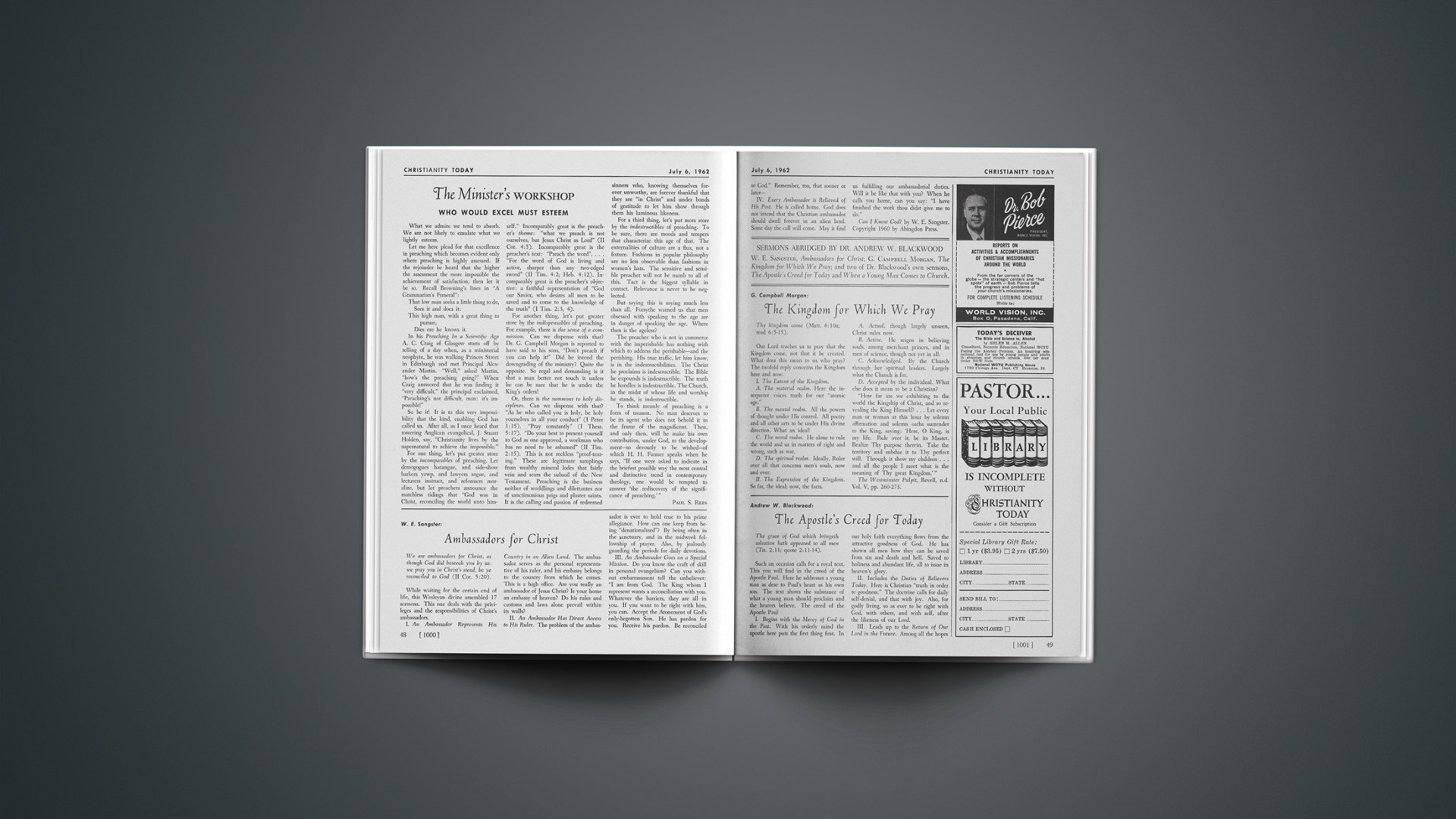What we admire we tend to absorb. We are not likely to emulate what we lightly esteem.
Let me here plead for that excellence in preaching which becomes evident only where preaching is highly assessed. If the rejoinder be heard that the higher the assessment the more impossible the achievement of satisfaction, then let it be so. Recall Browning’s lines in “A Grammarian’s Funeral”:
That low man seeks a little thing to do, Sees it and does it:
This high man, with a great thing to pursue,
Dies ere he knows it.
In his Preaching In a Scientific Age A. C. Craig of Glasgow starts off by telling of a day when, as a ministerial neophyte, he was walking Princes Street in Edinburgh and met Principal Alexander Martin. “Well,” asked Martin, “how’s the preaching going?” When Craig answered that he was finding it “very difficult,” the principal exclaimed, “Preaching’s not difficult, man: it’s impossible!”
So be it! It is to this very impossibility that the kind, enabling God has called us. After all, as I once heard that towering Anglican evangelical, J. Stuart Holden, say, “Christianity lives by the supernatural to achieve the impossible.”
For one thing, let’s put greater store by the incomparables of preaching. Let demogogues harangue, and side-show barkers yawp, and lawyers argue, and lecturers instruct, and reformers moralize, but let preachers announce the matchless tidings that “God was in Christ, reconciling the world unto himself.” Incomparably great is the preacher’s theme: “what we preach is not ourselves, but Jesus Christ as Lord” (2 Cor. 4:5). Incomparably great is the preacher’s text: “Preach the word”.… “For the word of God is living and active, sharper than any two-edged sword” (2 Tim. 4:2; Heb. 4:12). Incomparably great is the preacher’s objective: a faithful representation of “God our Savior, who desires all men to be saved and to come to the knowledge of the truth” (1 Tim. 2:3, 4).
For another thing, let’s put greater store by the indispensables of preaching. For example, there is the sense of a commission. Can we dispense with that? Dr. G. Campbell Morgan is reported to have said to his sons, “Don’t preach if you can help it!” Did he intend the downgrading of the ministry? Quite the opposite. So regal and demanding is it that a man better not touch it unless he can be sure that he is under the King’s orders!
Or, there is the summons to holy disciplines. Can we dispense with that? “As he who called you is holy, be holy yourselves in all your conduct” (1 Peter 1:15). “Pray constantly” (1 Thess. 5:17). “Do your best to present yourself to God as one approved, a workman who has no need to be ashamed” (2 Tim. 2:15). This is not reckless “proof-texting.” These are legitimate samplings from wealthy mineral lodes that fairly vein and seam the subsoil of the New Testament. Preaching is the business neither of worldlings and dilettantes nor of sanctimonious prigs and plaster saints. It is the calling and passion of redeemed sinners who, knowing themselves forever unworthy, are forever thankful that they are “in Christ” and under bonds of gratitude to let him show through them his luminous likeness.
For a third thing, let’s put more store by the indestructibles of preaching. To be sure, there are moods and tempers that characterize this age of that. The externalities of culture are a flux, not a fixture. Fashions in popular philosophy are no less observable than fashions in women’s hats. The sensitive and sensible preacher will not be numb to all of this. Tact is the biggest syllable in contact. Relevance is never to be neglected.
But saying this is saying much less than all. Forsythe warned us that men obsessed with speaking to the age are in danger of speaking the age. Where then is the ageless?
The preacher who is not in commerce with the imperishable has nothing with which to address the perishable—and the perishing. His true traffic, let him know, is in the indestructibilities. The Christ he proclaims is indestructible. The Bible he expounds is indestructible. The truth he handles is indestructible. The Church, in the midst of whose life and worship he stands, is indestructible.
To think meanly of preaching is a form of treason. No man deserves to be its agent who does not behold it in the frame of the magnificent. Then, and only then, will he make his own contribution, under God, to the development—so devoutly to be wished—of which H. H. Farmer speaks when he says, “If one were asked to indicate in the briefest possible way the most central and distinctive trend in contemporary theology, one would be tempted to answer ‘the rediscovery of the significance of preaching.’ ”










